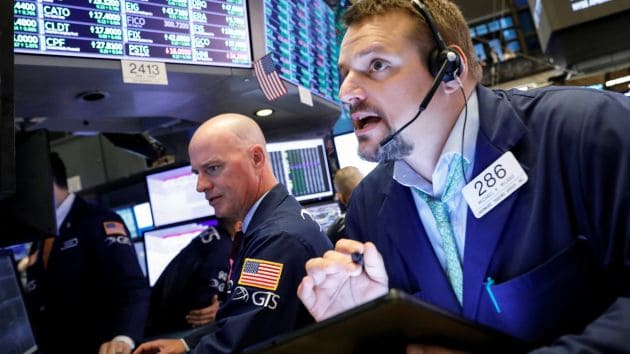
Stocks fell slightly on Wednesday as weak retail sales data, coupled with persisting trade-war fears, offset strong earnings results.
The Dow Jones Industrial Average dipped 22.82 points, or 0.1% to close at 27,001.98. The S&P 500 slid 0.2% to 2,989.69 while the Nasdaq Composite dipped 0.3% to 8,124.18.
Retail sales unexpectedly dropped 0.3% in September, marking their first decline in seven months. Spending cutbacks on motor vehicles and online purchases, among other factors, weighed down retail sales.
“Given that the U.S. consumer is 68% of the economy, it’s important that the consumer holds up and continues to spend,” said Quincy Krosby, chief market strategist at Prudential Financial. “But we also heard from the banks that consumers are spending. We’re seeing it in credit cards and loans growth.”
“The question is whether that is going to erode,” Krosby said.
The weak data added to recent concerns over the potential for a recession. Global economic data points to slower growth while the U.S. manufacturing sector is already contracting. In the center of those worries is the ongoing U.S.-China trade war, which is becoming increasingly uncertain.
The Wall Street Journal reported there are questions about how much more in U.S. agricultural products China will actually buy and for how long. These worries come even after China and the U.S. agreed last week to the first phase of a broader trade deal.
Meanwhile, Bloomberg News said China wants U.S. tariffs on Chinese goods rolled back before moving forward with the purchases.
“If the president resorts to another round of tariffs, that will increase the probability of a recession, and if we have a recession the stock market drops at least 25%,” Leon Cooperman, founder of Omega Advisors, told CNBC’s “Squawk Box.”
President Donald Trump said Wednesday a deal probably won’t be signed until his meeting with Chinese President Xi Jinping in Chile next month. He noted the deal was currently being worked on.
To top it all off, China threatened to take countermeasures against the U.S. in response to a bill favoring protesters in Hong Kong. The U.S. House of Representatives pass a bill on Tuesday that would end Hong Kong’s special trading status with the U.S. unless the State Department determined found human rights were being respected.
These trade-related concerns overshadowed the release of strong quarterly results.
Bank of America reported Wednesday better-than-expected earnings and revenue for the third quarter, sending its stock up 1.5%. The company’s consumer and banking businesses helped offset slumping trading revenues.
United Airlines, meanwhile, rose more than 2% on earnings that topped analyst expectations. The airline also raised its full-year earnings guidance.
So far, the corporate earnings season is off to a blistering start. Of the S&P 500 companies that have reported through Wednesday morning, 83% have topped analyst expectations, FactSet data shows.
“I think this is a preview of things to come,” said Kate Warne, investment strategist at Edward Jones. “While not all earnings are going to be like this, we’re going to get solid earnings.”
“This will be a catalyst for investors who are a bit more cautious to feel comfortable with putting more money back into the market,” said Warne.
Stocks rallied on Tuesday as J.P. Morgan Chase, UnitedHealth and Johnson & Johnson sparked an earnings-led rally. Investors also cheered positive developments around Brexit.
Netflix rose around 1% after the close on stronger-than-expected earnings for the third quarter. The streamer’s stock is down more than 20% in the past three months as competitors including Apple and Disney near the launches of their own streaming platforms, which many analysts warn could hamper Netflix’s subscriber growth.
Officials and diplomats said that differences over the terms of the U.K.’s split from the European Union had narrowed significantly on Tuesday. A crucial two-day summit of EU leaders begins in Brussels on Thursday. It is the last such meeting currently scheduled before the fast-approaching Brexit deadline.
The world’s fifth-largest economy is due to leave the EU on Oct. 31 and Prime Minister Boris Johnson has repeatedly insisted he will not request another delay.
Gregory Faranello, head of U.S. rates at AmeriVet Securities, said the market needs more clarity on both Brexit and trade to put recessionary worries to rest. “The jawboning is not just going to cut it at this point.”

